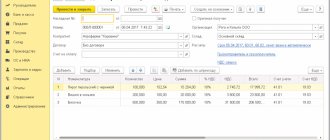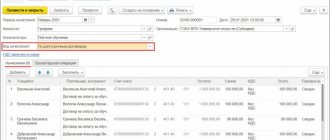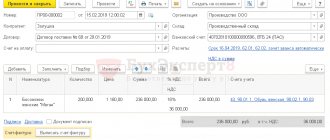Penalties for non-payment of VAT provided by law
Failure to make VAT payments on time will result in a fine. In addition, if you do not pay your obligations on time, there is a risk of interest being charged. The introduction of a fine for non-payment of VAT, as well as other sanctions, is provided for in Articles 75 and 122 of the Tax Code of the Russian Federation. A fine in accordance with Article 122 is imposed after an inspection by the fiscal authority, if the failure to pay or pay only some portion of the tax was due to incorrect calculation.
If failure to make a payment is due to the fact that when calculating the base, an underestimation was made unintentionally, the fine will be 20% of the amount of the unpaid debt. If the action was intentional, the fine will double. If the payer submitted a declaration and the amount of the fee was indicated correctly, but was not paid on time, penalties are charged, but there is no need to pay a fine. This rule is relevant if the payer submitted an updated document.
The penalty is set as a percentage of the unpaid tariff. The calculation takes into account 1/300 of the Central Bank refinancing rate for each day the obligation is overdue. For legal entities, such calculation rules are relevant if the number of days of delay is no more than 30. Subsequently, the rate will be doubled.
According to Article 112 of the Tax Code, there are some circumstances that can mitigate guilt to some extent. If you have them, you can reduce the fine by more than 2 times. One of these circumstances is considered to be overpayment of the contribution. In addition, there are opinions that voluntary repayment of arrears also mitigates guilt. If the violation was committed for the first time, there is also a chance of paying less money for the act committed.
Thus, for late tax payments, liability is provided in the form of penalties in any case. The fine will be transferred if the reason for non-payment is a reduction in the tax base. The size of the sanction can be 20 or 40%.
What circumstances mitigate liability for a tax offense?
In paragraphs 3 p. 1 art. 112 of the Tax Code of the Russian Federation lists circumstances that mitigate (when determining the degree) the guilt of incomplete payment or complete non-payment of taxes. For example, these include a combination of difficult personal (family) circumstances or the presence of a threat. The list is not closed, so the tax inspectorate or the court may consider other circumstances not included in the list to be mitigating.
See also the material “Mitigating circumstances can help reduce the fine by more than half .
Punishment for non-payment of federal insurance contributions
Not only failure to pay VAT on time, but also failure to make contributions entails punishment, and in some situations even criminal liability. Failure to pay insurance premiums involves punishment if the arrears resulted from an understatement of the calculation base, the determination of the amount to be paid incorrectly, or in the event of other unlawful acts.
According to Article 122, if contributions were not paid unintentionally, the fine will be 20% of the arrears, if intentionally - 40%. In case of failure to make a payment due to a violation of accounting standards, there is a risk of a sanction from 5 to 20 thousand; if the violation is committed again, there is a risk of disqualification for 12-24 months.
If a person made a mistake in the initial calculation, but paid the arrears before submitting the updated document, the fine will not be transferred. It will be accrued only if the outstanding obligations have been adjusted upward.
If the tax authorities establish that failure to make a contribution was the result of a crime, the director, chief accountant, and other persons who contributed to the commission of the illegal act may be sentenced to liability.
We calculate penalties using an algorithm
So, you are faced with the need to pay a VAT penalty. How to correctly calculate the amount to be accrued and paid to the budget? Let us present the calculation procedure in the form of an algorithm consisting of the following sequential actions:
Stage 1. We identify the amount of arrears. This indicator is defined as the amount of debt (outstanding or repaid in arrears).
Stage 2. Determine the number of days the payment is overdue. To do this, you need to record the day the delinquency began and the day the debt was repaid. The payment is considered overdue the day after the payment deadline (if VAT for February 2016 had to be paid before March 25, then March 26 is considered the day the arrears occurred). The day of debt repayment is confirmed by a payment order.
Stage 3. Find out what refinancing rate was in effect during the period of late payment. This indicator is published on the official website of the Central Bank.
Step 4. Calculate the penalty using the formula:
P = Week * St. Ref. / 300 – Pr,
where P is the amount of penalties payable,
Art. Ref. – refinancing rate in effect during the period of late payment;
Pr – number of days of delay.
We also recommend looking at the calculator in Excel for calculating penalties for taxes and fees.
Sanctions for late payment of corporate property tax
The fine for late payment of VAT, as well as other taxes, is provided for in accordance with the Tax Code of the Russian Federation. Responsibility for non-payment can be presented in the form of a fine, penalty, and in some situations, criminal liability is provided. If you do not pay VAT on time, as well as property taxes and other fees, penalties will be charged for each day of delay.
According to Article 45 of the Tax Code, the payer must independently fulfill the obligation to pay the tax. Obligations must be fulfilled on time, but a person can make payments ahead of schedule. If payment was not received on time or was paid only in a certain proportion, arrears arise and the fiscal authority collects a fee.
According to Article 75 of the Tax Code, a penalty is charged on the arrears every day. Penalties are paid along with the payment of debt on taxes and fees, or after payment of the debt in full. Article 122 defines liability for failure to pay taxes due to incorrect actions, including underestimation of the tax base and incorrect calculation of fees. As a result, you must pay a fine of 20 or 40%.
Failure to fulfill payment obligations is considered grounds for the tax authorities to send a demand to the payer for payment of the amount. This requirement can be delivered against signature personally to the head of the organization or by registered mail.
Penalty - with or without VAT
Many accountants are wondering whether the penalty is calculated with or without VAT, how to correctly determine its size and which regulatory document to refer to in order to avoid further penalties from regulatory authorities.
Two answers can be given to this question, based on completely opposite points of view of specialists and officials:
- Value added tax is charged on collection, since the tax base for it is made up of all amounts that are associated with payment for sold products (clause 2, clause 1, article 162 of the Tax Code of the Russian Federation).
- VAT is not charged due to the fact that, according to Art. 331 of the Civil Code of the Russian Federation, the agreement on collection is an independent document of title, separate from the main contract, and collection is not directly related to the sale of goods (Letter of the Ministry of Finance of Russia dated 06/08/2015 No. 03-07-11/33051).
Let's look at each position in more detail.
The first point of view of officials is that the penalties that the seller receives from the buyer for late payment are directly related to payment for the goods, and therefore they must be included in the tax base for value added tax. This position is confirmed by Letters of the Ministry of Finance of Russia No. 03-07-11/311 dated 08.17.2012, No. 03-07-11/1 dated 05.18.2012 and No. 03-07-11/222 dated 09.11.2009, but at the moment no There is not a single judicial precedent to support this point of view of experts. According to the Ministry of Finance, penalty obligations are determined in the terms of the contract and, in fact, act as one of the pricing tools for goods sold, therefore they must be included in the tax base (Letters of the Ministry of Finance of Russia No. 03-07-11/64436 dated 09.11.2015, No. 03 -07-15/6333 from 03/04/2013).
As for the second position, officials, in response to the question whether the penalty is subject to VAT or not, argue that the penalties received by the seller are sanctions imposed on the buyer for violating his obligations, that is, payment terms. That is why fines and penalties have nothing to do with the sale of products and should not be included in the tax base (Resolution of the Presidium of the Supreme Arbitration Court of the Russian Federation dated 02/05/2008 No. 11144/07). It is this position that answers the question of whether a penalty based on a court decision is subject to VAT. There are many official court decisions confirming that value added tax should not be taken into account when calculating penalties.
To date, disputes continue, and experts cannot give an unambiguous and legally enshrined answer to this problem.
Circumstances mitigating liability
If there are circumstances that are considered mitigating, the blame for late payment and delay can be reduced, for example, the amount of the fine for non-payment of VAT and other sanctions. Article 112 of the Tax Code provides circumstances that are considered mitigating to a certain extent.
In order to prevent arrears and late payments, it is recommended to pay special attention to maintaining tax records; mistakes should not be made in documents that are sent to the fiscal authorities. If you find a defect in the document, you should immediately report it to the tax service. Additional arrears may be required.
Penalties: concept and cases of payment
First of all, you should understand what a penalty is and when it becomes necessary to pay it. This is a type of penalty or sanction for late fulfillment of financial obligations. In Art. 75 of the Tax Code of the Russian Federation is described as the amount of money paid when transferring taxes to the budget at a later date than the legally established deadline for payment.
Thus, any delay in tax payment entails the need to calculate penalties. Most often, such problems arise when calculating and paying VAT. Let's consider cases when an organization is forced to pay sanctions:
- You cannot insure yourself against mistakes. It may happen that the accountant made an error in the calculations, which led to an underestimation of the actual tax base and, as a result, arrears in taxes. Or one of the details, for example, KBK, is filled out incorrectly. Why the payment was classified as unclear. However, the discrepancy was identified by the company independently.
- The arrears were discovered by the tax authorities, and the organization was notified about it in a timely manner.
- Due to some circumstances, the company filed a declaration and paid the VAT amount later than the day established by law.
Regardless of the reasons that caused the delay, the company is obliged to eliminate it, as well as pay sanctions in the form of penalties accrued for each day from the moment it occurred.
However, in this case, the taxpayer organization additionally faces a fine, which can be avoided if everything is corrected before the Federal Tax Service finds out about the violation. To do this, it is necessary on the basis of clause 4 of Art. 81 Tax Code of the Russian Federation:
- transfer the amount of penalties and the missing part of the VAT to the budget;
- submit an updated declaration.
Payment of penalties when a debt is discovered by the tax inspectorate
If the tax authorities independently discover that the tax is overdue, the company will be sent a request to pay the missing part in a certain amount. In addition, the Federal Tax Service may oblige you to pay a fine and penalties.
It is important to immediately check the correctness of the requirements, since tax authorities often make mistakes when making calculations, or as a result of system failures in the program.
Your actions:
- Check the compliance of claims with the real state of affairs, check the reports.
- Identify the delay yourself and calculate the sanctions by comparing the obtained values with those provided by the Federal Tax Service. Please note that tax authorities do not have the right to provide only the total amount of accrued penalties. A detailed calculation must be attached indicating the period and refinancing rate (Resolution of the Federal Antimonopoly Service of the East Siberian District dated November 6, 2008 in case No. A19-6266/08-20-F02-5376/08).
The requirements of the tax inspectorate must be fulfilled within ten calendar days (clause 4 of Article 69 of the Tax Code of the Russian Federation), so you need to act quickly. If an error is discovered, you must report it to the Federal Tax Service with a request to revise the data. If you are late with your application, a collection order will be sent to the bank to withdraw money from your organization’s account in the amount of the accumulated debt (this includes the missing part of the tax, a fine, and a penalty) forcibly (Clause 3 of Article 46 of the Tax Code of the Russian Federation ).
To verify the correctness of the tax payment, you need to provide an application and a letter requesting a review of the requirements of the Federal Tax Service inspectorate. To speed up the procedure, it is advisable to attach copies of the declaration and other documents confirming your case. If the absence of arrears is confirmed, but the fine and the amount of accrued penalties have already been paid, then they can be offset against a future tax payment or returned to the organization’s account.









